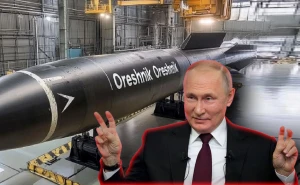
American analysts explain why Putin's address to federal assembly contained few specifics about war in Ukraine
Russian dictator Vladimir Putin's address to the Russian Federal Assembly did not articulate specific goals or intentions for the war in Ukraine, but he reinforced several longstanding rhetorical lines aimed at gaining more space and time for a protracted war
The Institute for the Study of War (ISW) reports.
Thus, Putin said that Russia launched a "special military operation" in Ukraine a year ago to protect people on the "historical lands of Russia," ensure Russia's internal security, eliminate the threat from the Ukrainian "neo-Nazi regime," which he said has existed since 2014, and protect the population of Donbas.
The Russian dictator also accused the collective West of arming Ukraine and deploying bases and biolaboratories near Russia's borders, thereby allegedly unleashing a war against Russia.
According to the Institute, Putin mistakenly compared the Armed Forces to various Nazi divisions and thanked the Russian army for fighting the "Nazi threat," and a significant part of his speech was devoted to the alleged resilience of Russia's economic, social, and cultural spheres.
"Putin's speech notably re-engaged with several long-standing Russian information operations regarding the justifications of the war and did not present an inflection in Russia’s rhetorical positioning on the war. Putin could have used this event to articulate new objectives and means for achieving them, such as announcing another formal wave of partial mobilization, redefining the “special military operation” as an official war, or taking additional steps to mobilize the Russian defense industrial base in a more concrete way," the analysts emphasized.
Instead, according to experts, the Russian president said very little of substance, probably in order to create informational preconditions for a protracted war in Ukraine, without articulating specific time goals and presenting the war as existential for the Russian population.
Also, in their opinion, Putin's statement about suspending Russia's participation in the Strategic Arms Reduction Treaty (START) attracted more attention than the relatively formulaic content of the rest of the speech.
Toward the end of his speech, Vladimir Putin said that the collective West had used START to try to inflict a strategic defeat on Russia, so Russia was suspending its participation in the Treaty, although the dictator emphasized that suspension was not a complete withdrawal. Putin called on the Russian Defense Ministry and Rosatom to ensure readiness for nuclear weapons tests.
"Putin made this statement in order to reintroduce nuclear rhetoric into the information space, thereby distracting from the meaninglessness of the rest of his speech," ISW said.
It is noted that many Russian bloggers condemned the inability of the Russian president to use his speech to put forward new goals for the war, outline new measures to support the war, or hold the Russian authorities accountable for their numerous military failures.
They criticized Putin's speech as formulaic and without any significant action. Igor Girkin, in particular, argued that Putin said nothing meaningful for 40 minutes, omitting Russia's military defeats, military failures, and economic downturn. And that the Russian president failed to hold Russian government officials accountable.
Girkin also expressed disappointment that Putin "did not use the address to officially recognize the war, announce further targets, or oppose Western sanctions."
One blogger said that the suspension of Russia's participation in START was politically symbolic, but complained that the suspension would not improve Russia's situation on the battlefield, instead calling on Russia to prevent Western military aid from being delivered to Ukraine.
Another blogger compared Putin to a corpse and repeated many of Girkin's complaints about accountability and action. Russian military officials emphasized the need for decisive action and called on Russia to promote the growth and advancement of military leaders who have proven their history of decisive action on the battlefield.
And the founder of Wagner's PMC, Yevgeny Prigozhin, claimed that he did not watch the Russian dictator's speech live because he was too busy supplying the ammunition needed to continue effective combat operations.
-
On February 21, Russian dictator Vladimir Putin delivered a message to the federal assembly and announced that Russia had decided to suspend its participation in the Strategic Arms Reduction Treaty. He also ordered the Russian military to prepare for nuclear weapons tests. The Russian president also did not rule out that he could "expand the war" if Ukraine is supplied with long-range weapons.
- News













































